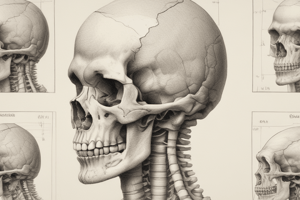Podcast
Questions and Answers
Which of the following are types of primary bone tumors? (Select all that apply)
Which of the following are types of primary bone tumors? (Select all that apply)
- Ewing sarcomas (correct)
- Chondromas (correct)
- Prostate cancer
- Fibrous dysplasia (correct)
What are chondromas?
What are chondromas?
Benign tumors producing hyaline cartilage
Ewing sarcomas are considered benign tumors.
Ewing sarcomas are considered benign tumors.
False (B)
What percentage of skeletal metastases in adults originates from cancers of the prostate, breast, kidney, and lung?
What percentage of skeletal metastases in adults originates from cancers of the prostate, breast, kidney, and lung?
What is the primary cause of osteolytic lesions?
What is the primary cause of osteolytic lesions?
Which tumor is predominantly occurring in adolescents?
Which tumor is predominantly occurring in adolescents?
In children, metastatic disease derives most commonly from __________.
In children, metastatic disease derives most commonly from __________.
What are osteosclerotic responses typically induced by?
What are osteosclerotic responses typically induced by?
Flashcards are hidden until you start studying
Study Notes
Major Categories of Primary Bone Tumors
- Chondromas: Benign tumors that produce hyaline cartilage, primarily found in the digits.
- Osteochondroma: Exostosis with a cartilage cap related to mutations in EXT genes, with sporadic and syndromic forms.
- Ewing Sarcomas: Aggressive malignant tumors composed of small round cells, commonly associated with the chromosomal translocation t(11;22).
- Fibrous Dysplasia: A disorder resulting from gain-of-function mutations during development, affecting bone structure.
- Osteoblastoma and Osteoid Osteoma: Benign tumors formed by osteoblasts that synthesize osteoid.
- Osteosarcoma: Malignant tumor of osteoblasts, primarily affecting adolescents and characterized by aggressive behavior.
Metastatic Disease
- Over 75% of skeletal metastases in adults originate from prostate, breast, kidney, and lung cancers.
- In children, common sources of metastatic disease include neuroblastoma, Wilms tumor, osteosarcoma, and Ewing sarcoma/PNET.
- Osteolytic Lesions: Result from tumor cell production of prostaglandins, interleukins, and PTH-related protein which stimulate osteoclast activity, leading to bone resorption.
- Osteosclerotic Responses: Typically induced by prostate cancer via WNT protein production, promoting osteoblastic activity.
Overall Insights
- Primary bone tumors are categorized based on the originating cell type or the produced matrix, with most being benign.
- Metastatic tumors are significantly more common than primary neoplasms, especially from major cancers like lung, prostate, kidneys, and breast.
Studying That Suits You
Use AI to generate personalized quizzes and flashcards to suit your learning preferences.




